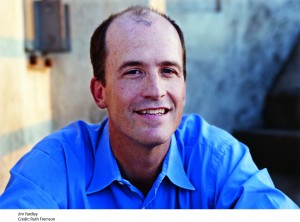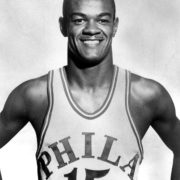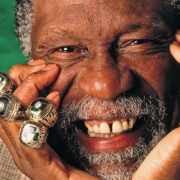My friend the author on Yao, Lin and the Chinese basketball system. Originally posted Friday, March 9 on Slam Online.
Jim Yardley was my friend and neighbor throughout the three and a half years I lived in Beijing. We ate, drank and hung out together often, usually sharing our tales of adventure. As the New York Times Bureau Chief, Jim knew the country inside and out, as evidenced by the 2006 Pulitzer Prize for International Reporting he shared for an in-depth series on the Chinese legal system.
There were only a couple of small slices of Chinese life I felt I understood better than Jim—and one of them was basketball. I was, after all, SLAM’s man in China and had gotten pretty deeply into Chinese basketball. So I was surprised when he told me that he would be writing a book—about basketball in China. I was not, however, the least bit surprised to realize that my friend had penned a masterly work when I read the final product, Brave Dragons: A Chinese Basketball Team, an American Coach, and Two Cultures Clashing.
Jim Yardley does not do half-way and he immersed himself in the Chinese Basketball Association, in the process capturing much of what makes China so wonderfully contradictory—vibrant but stilted, incredibly modern but remarkably moribund.
Jim immersed himself in the subject, spending a year with the Taiyuan Brave Dragons after the team—the laughing stock of the CBA—hired ex-Hawks and Sonics coach Bob Weiss, the first former NBA head coach to take over a Chinese squad. Careful SLAM readers will recognize the Brave Dragons as the dysfunctional team God Shammgod played for when I profiled him in 2006.
Brave Dragons is a must-read for any hoops fan with a hankering to understand what is and isn’t happening in China.
SLAM: I was struck by the way you very clearly and rightly wrote about how Chinese players and fans have this ingrained sense of athletic inferiority—that they can’t be as good as Americans. Does that help explain the real power of Yao Ming?
JY: Yao Ming’s success in the NBA was huge in bolstering national pride, not only because he was so big—thus defying the clichés about Chinese being small—but because he became an All Star. Chinese love winners, and Yao was a big winner. But probably more interesting is what is happening right now with Jeremy Lin.
Lin has roots in China but his family is from Taiwan. He is 6-3—tall but hardly a giant—and is disproving all the preconceptions held by many Chinese, including coaches, about their own physical inferiority. I’ll never forget listening to a coach tell me that Chinese players were the equivalent of substandard raw materials, as far as producing basketball players. The best way to improve them, these coaches argued, was through relentless and repetitious drilling.
Lin is proving that someone with an Asian heritage can physically compete, even dominate, against the very best athletes in the world. Of course, Lin is American, and, without sounding jingoistic, I don’t think that should be discounte
d; he grew up in an environment where he was better able to develop his individual skills. His parents also sound like they were incredibly supportive. And, most of all, Lin sounds like a very determined guy, and, in the end, talent rarely rises without determination, too.
SLAM: I don’t think that people who haven’t spent time there could really understand how deep that feeling is. I believe that Lin could be a transformational player since he is essentially normal sized (compared to Yao).
JY: You are absolutely right. The whole Chinese basketball system is consumed by the search for another Yao, or at least for other big players. Lin forces that equation to be changed. There are plenty of 6-3 players in China. But why aren’t they developing the way Lin did by growing up playing in the United States? I think that question will resonate and, I hope, will help change the typical Chinese training methods.
To some degree, it is already happening. Some of the best young players are being identified and sent to the USA, Australia and Europe for coaching and conditioning.
SLAM: One of the oddest things about watching Chinese basketball is how lazy the players seem to be. Once you start to understand it, it becomes obvious that that’s only because it’s a defense mechanism because they have to work so hard—six days a week, 50 weeks a year. The insanity of this is obvious to every foreign observer. Do you think it is becoming more apparent to people within the system?
JY: You’ve made a crucial observation about the vicious cycle of how Chinese players are trained. They practice roughly 11 months a year, living as a team in a dormitory, often drilling and running two or three times a day. Players get worn down, also because most teams follow outdated weight lifting regimens and offer mediocre support from medical trainers.
So, yes, many players learn to loaf out of pure survival. They want to extend their careers, which means a certain amount of self-preservation is required. I do think many coaches are aware of this, but their response, usually, is just to push players harder in practice. Many Chinese coaches believe that players have to drill constantly, and practice daily, over months, to improve. It is pretty self-defeating actually.
The good news, though, is that many teams are starting to change, and these are the teams that are winning. The dominant team in the Chinese league—the Guangdong Southern Tigers—also happens to be the most enlightened, as far as training techniques.
SLAM: Right, but I’ve been surprised by how little impact that had for years. Do you think it’s finally starting to initiate more changes throughout the League?
JY: I think change is starting to happen, especially since I left. Bob Weiss was actually a breakthrough figure. Foreign coaches had been in China for years, but Weiss was the first big name. And his success in turning around the Brave Dragons influenced other teams. More and more teams have started hiring foreign coaches with experience in the NBA. Also, the league is gradually transitioning in its ownership structure. Fewer and fewer teams are now owned by local governments, or by government sports bureaus. More teams have private owners, and some of them are trying to emulate the Guangdong model. Not all, of course. The owner of the Brave Dragons is a private entrepreneur but his treatment of the team is decidedly old school.
SLAM: There is a younger generation of Chinese players, exemplified in your book by “Kobe” and Joy playing with more passion and more out of love. Is this an actual trend?
JY: That, to me, is one of the wonderful things about the league. The young guys love the game, and are desperate to win, and to play the game in a more free wheeling style. You can see their passion for the game.
In December, I met an 18-year-old kid playing for the Guangsha team in the Chinese league. He also played on the Chinese national junior team. His name is Wang Zirui. I think he has the potential to be a very, very good point guard. I hope so.
SLAM: As you detailed recently in the NYT Magazine, the NBA’s China plans are struggling. How ecstatic are they about Lin?
JY: The NBA remains very popular in China, but they have seen their ambitions curbed in recent years. They wanted to create their own NBA league in China, if in partnership with the CBA. But the Chinese league turned them down. They talked about creating a network of arenas. But that also hasn’t happened. Television ratings had sunk since Yao’s best years—say, 2005 and 2006. Again, the League was still popular, but the NBA was facing challenges in finding new revenue streams. Now along comes Jeremy Lin.
Fans in mainland China and Taiwan are going nuts. Knicks jerseys, real and counterfeit, are flying off the shelves. I assume television ratings are shooting up. Given that Yao retired last year, Lin would seem to arrive with absolutely perfect timing for the NBA. He doesn’t solve some of their deeper issues, about finding new ways to make money, or about developing a league. But I assume they are absolutely thrilled.
SLAM: Did David Stern sacrifice 18 virgins to make this happen?
JY: I heard it was 24 oxen.
SLAM: There was a great line in your book about the failure of the CBA to change, from someone who had been hired to analyze the league: “You can’t really understand something if your job depends on you not understanding it.” Does that still apply?
JY: It’s important to remember that the CBA is a government bureaucracy as much as a sports league. It is run by guys who either played or coached in the league, or by other bureaucrats, so they are invested in the status quo. However, they are facing real pressure to improve the quality of play, since fans need only watch the NBA on television to see a better basketball product. The CBA is trying to do this in superficial ways, by bringing in cheerleaders and game time music and stuff like that. They also seem more interested in developing better talent.
But many people question whether the league can ever achieve its potential if it remains controlled by the government. The ultimate responsibility of the CBA is not to put on the best possible basketball league for fans; it is to develop a national team to compete for China in international competitions. Several years ago, the CBA hired a consulting firm for advice on how to improve. The consulting firm drew up a plan in which the league would be largely separated from the government sports administration. There would be transparency in accounting, and other things. Needless to say, the CBA didn’t go for it.
SLAM: Is there an inherent conflict between one organization running the league and the national team?
JY: Yeah, lots of people think the CBA has got to attain greater independence from the government. It can’t develop properly otherwise. If the goal is to make the CBA a true commercial basketball league, then you can’t have government officials running it. Officials make policy that may or may not be conducive with winning CBA games. Private owners, dominated by a commercial impulse, just want to do whatever they can to win games.
SLAM: How excited were you when you found out that Bonzi Wells was coming to the team you were following?
JY: I had mixed feelings. Bonzi’s arrival meant another former NBA player, Donta Smith, would be cut; I really liked Donta and the team was doing really well with him. However, I realized that Bonzi was a hell of a story, and he was. He is a very complicated guy, and I hope I captured some of that in Brave Dragons. One thing I found interesting was the relationship between Bonzi and Boss Wang; they clashed, big-time, yet Boss Wang really respected Bonzi.
SLAM: Boss Wang is a seriously crazy dude and the Brave Dragons have long been notorious for being mercurial and terrible. The year I was following God Shammgod off and on for SLAM, they went through four or five coaches—and had a translator who couldn’t really speak English. Did you choose them to follow because of their nuttiness and the assumption that whatever happened would be interesting and fun to write about?
JY: Someone told me that Boss Wang was like a Chinese Steinbrenner, or maybe a Mark Cuban in his early days. To be honest, I knew almost nothing about Boss Wang when I hooked up with the team. I had heard that Weiss was coming to China and I contacted him to see if I could spend time with him. At that point, I hadn’t decided whether to follow one team, or to jump around the league, tackling different themes and subjects through different players and teams. But once I got to Taiyuan, and settled in with the Brave Dragons, I realized that I had a hell of a story with just this team. It was oftentimes hilarious, oftentimes heartbreaking but always interesting.
SLAM: Foreign players in China are in a tough position: They feel they need to score 40 ppg to earn their contract—and sometimes the teams directly make them feel that way. But doing so does not help Chinese players develop. Do they feel that tension?
JY: As a foreigner, where your livelihood is at stake, you do have to be something of a basketball mercenary in China. The system is weird: Teams are usually allowed only two foreigners, and those foreigners are the highest paid guys on the team. They also are limited in their playing time. So when they are in the game, they’ve got to justify their contracts, which means shooting and shooting often.
Some guys just flat out gun at will. Others, though, manage to fit into the team and score their points. But, absolutely, tensions do arise between foreign and Chinese players after a long season. Usually, it boils down to respect; if one side doesn’t offer it to the other, problems can arise.






Interesting interview. And Alan Paul is just the guy to do the job – friends of the author, a former expat in China, himself, and a writer about hoops. Like Alan’s book, “Big in China,” which uses music as a vehicle for insight on modern China, Yardley’s book uses basketball. Music and hoops – two things that most Americans are into – so both good starting points for checking out China. How lucky that Alan gets to write about both!
Thanks ick.